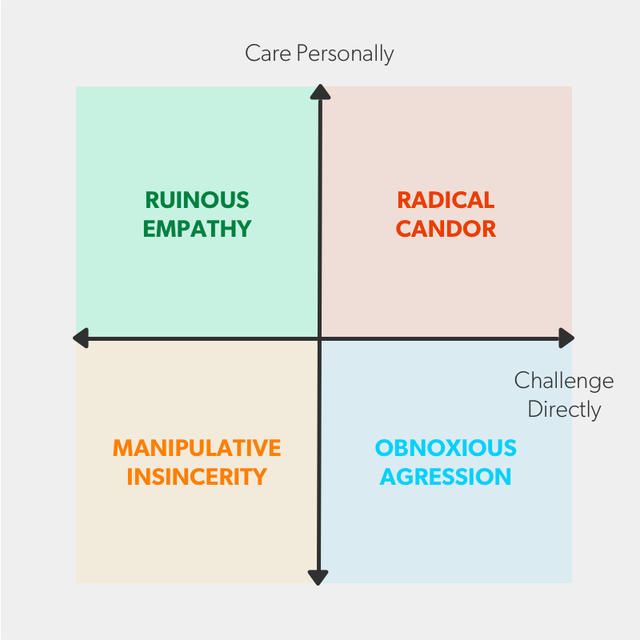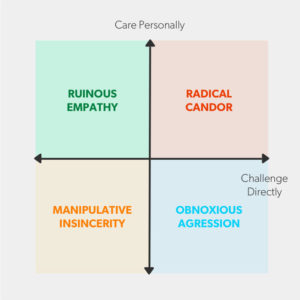
 One of the biggest trends in HR right now is radical candor.
One of the biggest trends in HR right now is radical candor.
Have you heard this phrase?
According to Kim Scott, radical candor is the moral obligation of managers to care for each team member personally and challenge ’em to grow. Managers must provide feedback that is humble, helpful, immediate, and in person. If you’re offering criticism, do it privately. If it’s praise, speak publicly.
And if you can’t do any of it because you don’t have time, Scott advises you to be an asshole.
Now, hey, don’t go out of your way to be an asshole. Please. It’s important to remember that you are trying to create an environment where you give good guidance because it’s your job and your obligation.
But you are allowed to be an asshole if you care about your colleagues but struggle to deliver important and candid messages. Being an asshole is better than being obnoxious, cruel, or (my favorite) ruinously empathetic.
Watch the video to learn more.
If you work in HR, radical candor can improve your interactions at work and help you stay in touch with your organization’s health. It shows that you care, by the way, which matters in the world of human resources and recruiting.
But don’t start being radically candid out of nowhere. It might help to show people Kim Scott’s video and let them know that you’re following a new trend called “radical candor.” As you learn, teach. And remember that candor isn’t necessarily about being direct and negative. Be honest, but don’t be personal.
And one more thing: HR professionals should note that radical candor is subjective. You can’t get away with being an asshole if nobody believes you care. In far too many organizations, the HR department is already full of assholes. Don’t be radically candid and a disengaged HR lady at the same time.
This reminded me a bit of Adam Grant’s “Agreeability Axis” – agreeable-disagreeable vs. giver-taker. “Radical Candor” would be most like “Disagreeable Giver”, i.e. someone who challenges you but with your interests at heart. Similar quadrants around “Manipulative Insincerity” (Agreeable Taker) and “Ruinous Empathy” (Agreeable Giver). Disagreeable doesn’t mean all the time, just that they are apt to be more vocal and objective in pointing out weaknesses in your plan, logic, assumptions, self-assessment of skills, etc.
Interesting. Thank you. I’ll have a look at that.
Adam Grant is such an interesting writer. If you haven’t yet picked up “The Originals,” it’s well worth it. More on disagreeable managers in that one…
Nice piece Laurie.
One important thing I have learned from an HR Leader related to this subject. Even though they were an asshole, one bit of advice stuck with me.
They said “Remember Rob, a leader casts a shadow”.
What they were simply saying was people watch what you say and how you act. If you are going to embrace radical candor you better cast the right shadow long before you give the radical candor.
Sadly enough that HR Leader still casted a asshole shadow..
HR leaders will generally cast that shadow. Something about the job makes them seem mean even when they may have wonderful personalities.
It’s mostly how people view them though. I mean if you walk up to most workers (me included) and offer the so called “Candid Radicalism” (yeah, I even took the word and made it mean), many will puff and say, “the mean HR lady is at it again.”
I think it would be great to introduce the concept of Radical Candor into performance and career conversations. We all know that performance management systems are not delivering and that leaders are still fearful of the “career conversation” How about if we make it ok to have “radical candor” into these conversations eg. I am wishing I had more opportunity to do x here so am thinking of moving on” Make it ok, then at least the leader can know what is going on and has a chance to do something about it. Such a useful concept and just what we need to rethink performance conversations right now. Thanks for sharing